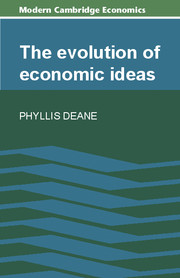Book contents
- Frontmatter
- Series preface
- Contents
- Introduction
- 1 Origins of modern economics
- 2 Adam Smith's theory of value
- 3 Origins of modern growth theory
- 4 Classical monetary theory
- 5 Ricardo on value, distribution and growth
- 6 Scope and methodology of classical political economy
- 7 The marginal revolution and the neo-classical triumph
- 8 The neo-classical theory of value
- 9 The Marxian alternative
- 10 Neo-classical orthodoxy in the inter-war period
- 11 Monetary theory in the neo-classical era
- 12 The Keynesian revolution
- 13 Twentieth-century growth theory
- 14 Methodological divisions in economics since Keynes
- Index of names
- Subject index
4 - Classical monetary theory
Published online by Cambridge University Press: 05 June 2012
- Frontmatter
- Series preface
- Contents
- Introduction
- 1 Origins of modern economics
- 2 Adam Smith's theory of value
- 3 Origins of modern growth theory
- 4 Classical monetary theory
- 5 Ricardo on value, distribution and growth
- 6 Scope and methodology of classical political economy
- 7 The marginal revolution and the neo-classical triumph
- 8 The neo-classical theory of value
- 9 The Marxian alternative
- 10 Neo-classical orthodoxy in the inter-war period
- 11 Monetary theory in the neo-classical era
- 12 The Keynesian revolution
- 13 Twentieth-century growth theory
- 14 Methodological divisions in economics since Keynes
- Index of names
- Subject index
Summary
The British classical economists who took up the torch which Adam Smith lit with the Wealth of Nations and who set out to perfect the ‘science’ of political economy won for their discipline a more significant prize than recognition as a minor academic subject. They turned it into a system of thought which commanded wide political respect: for the questions which gave direction and shape to their theoretical enquiries were questions of urgent practical concern to contemporary policy makers. When they found the analytical apparatus they had inherited from Smith lacking it was generally because it failed to provide them with the technique they needed to analyse current economic policy problems. The issues which dominated the first decade of the nineteenth century and which first drew Ricardo into active economic controversy were problems of monetary policy.
Monetary theory and monetary controversy have always evolved in intimate relation with real-world policy needs and economic debate on domestic, as distinct from international monetary issues, has generally been associated with a failure of the authorities responsible for regulating the money supply to steer a confident course between the Scylla of inflation and the Charybdis of deflation. So, although writers on economic questions have analysed the role of money in the economy for as long as they have been interested in the workings of an exchange economy, it is easy enough to decide where modern British monetary theory essentially begins, viz in the controversy set off by the problems involved in supplying the economy with the abnormal needs for money and credit facilities, necessitated by the prolonged French and Napoleonic wars of the late eighteenth and early nineteenth centuries.
- Type
- Chapter
- Information
- The Evolution of Economic Ideas , pp. 44 - 59Publisher: Cambridge University PressPrint publication year: 1978

